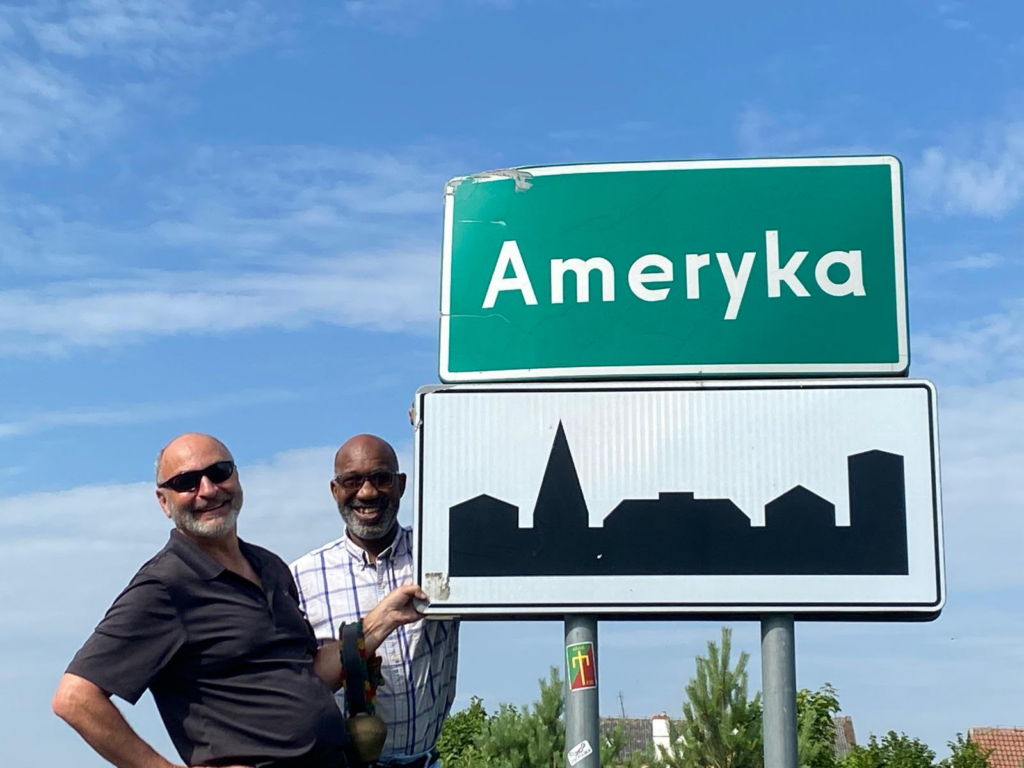
In Warsaw, a diverse group of English teachers from Poland and the neighboring countries of Estonia, Latvia, and Lithuania gathered for a weeklong workshop series designed to leave a lasting impact in classrooms throughout the region. Led by Specialists Anthony Nesbit and Dr. Jeff Share, the goal wasn’t merely to improve language instruction — it was to explore how English classrooms could become a springboard for environmental action. As Share noted, he and Nesbit were not only focused on teacher training but also sharing with participants “a sense of hope and empowerment through creating alternative media that promoted our connections and interdependence with the natural world.”
This week of workshopping was just one highlight from a larger project that took Nesbit and Share to both rural areas and urban centers in Poland. The project arose from a growing recognition of the need – identified by Jenn Uhler, Regional English Language Officer (RELO) at that time in Tallinn, Estonia – to address climate change and environmental issues in education, particularly in language learning contexts, throughout the region. From there, Nesbit and Share were brought on board to train teachers during workshops in the capital and several outlying regions. RELO Jen MacArthur, who was able to join the team for part of their journey, praised the approaches of both Specialists: “I especially appreciated how both of them shared real and recent experiences from their classrooms in the United States. They both brought special skills: Anthony motivated us all to join him as a citizen scientist; Jeff inspired us to write creatively and reflectively.”
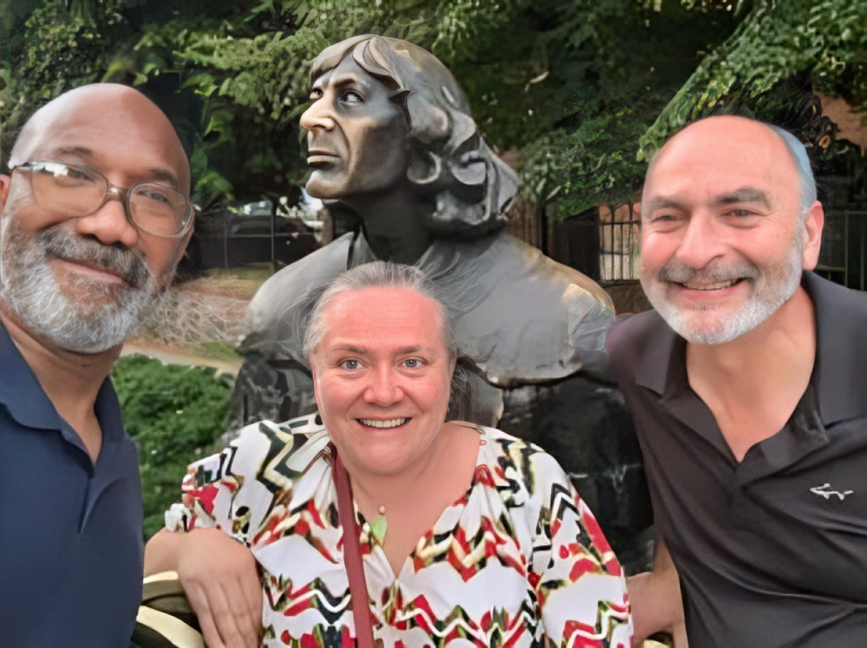
Nesbit and Share drew from decades of experience in education as they teamed up on the project. Nesbit, with 25 years of teaching Spanish and English, specializes in Project-Based Learning (PBL) and science, technology, engineering, and math (STEM) integration. Central to this work is a concept known as “citizen science,” in which people from all walks of life — not only those with extensive STEM backgrounds — are encouraged to engage in real scientific work. Throughout the project, Nesbit’s expertise shone in hands-on activities like community mapping, where teachers learned to help students reconnect with their local environments while practicing authentic English.
In the case of Share, a background in photojournalism and bilingual elementary education led to his current focus on critical media literacy. In his words, “my passion for environmental justice developed as I learned about the ways media shapes our understandings of the natural world.” Share introduced workshop participants to the concept of “ecowriting,” which focuses on encouraging students to reflect deeply on their connection with nature while developing language skills. “Ecowriting is writing that resonates deeply about your connection with nature,” he explained. “It’s writing as a process of reflection, expressing your thoughts, feelings, concerns, or ideas about your relationship with nature.”
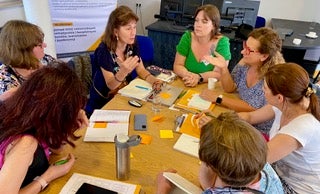
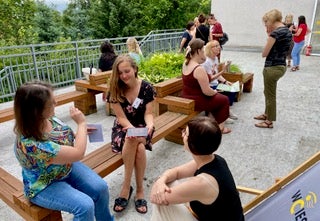
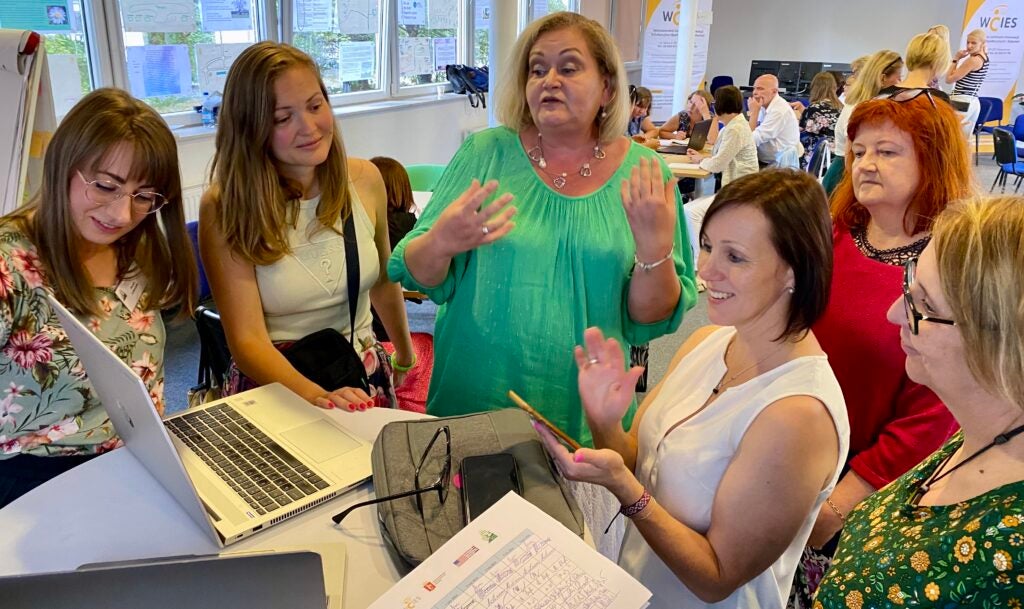
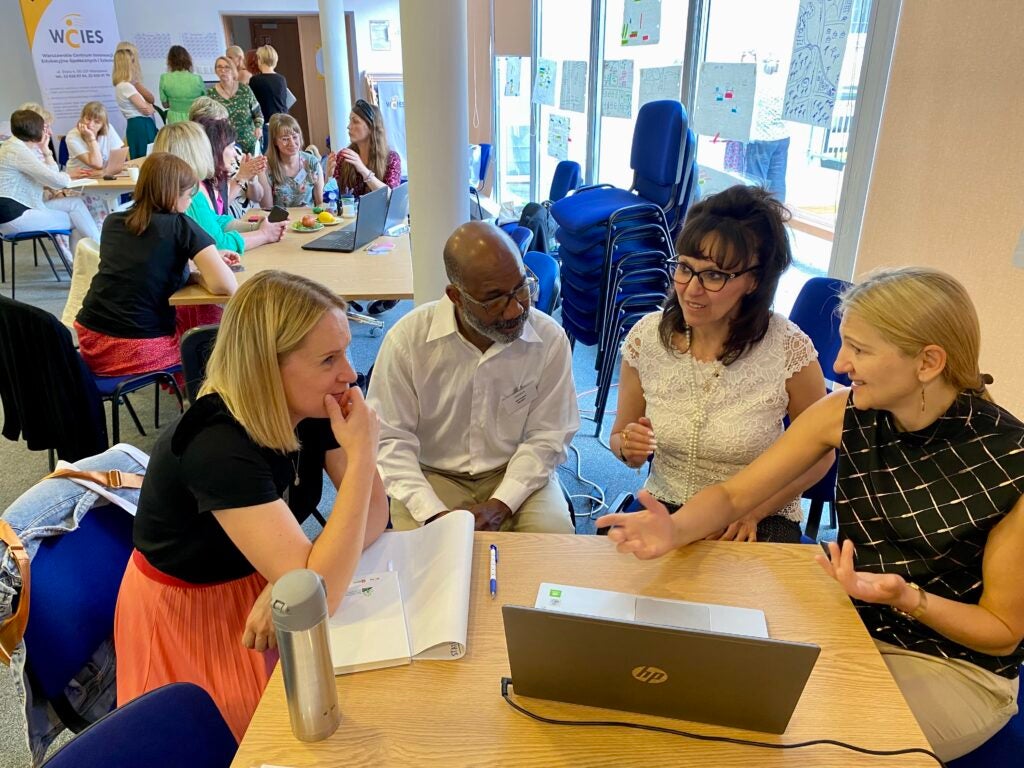
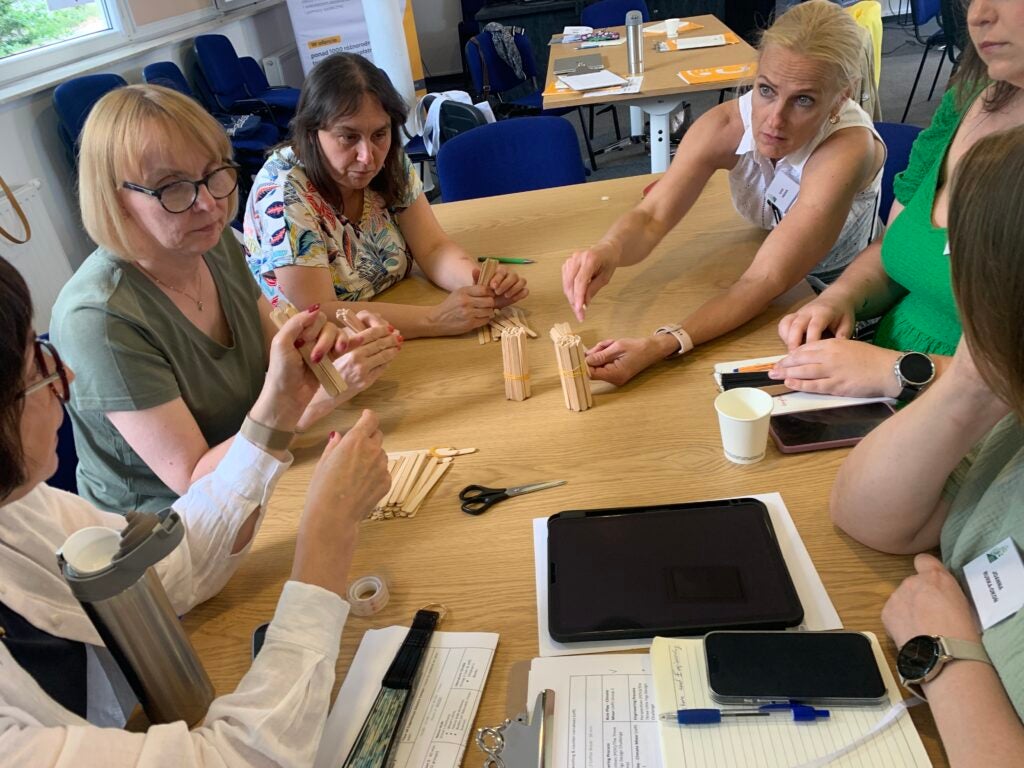
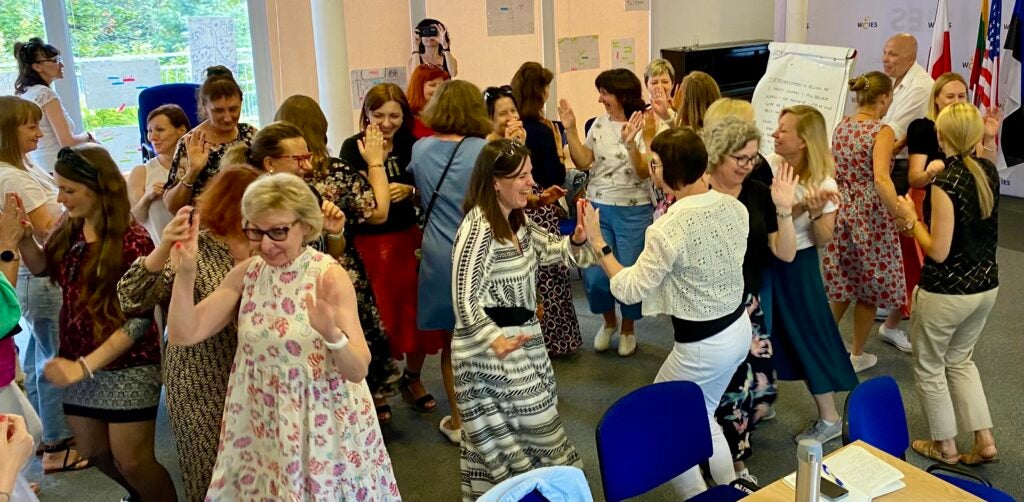
Despite their different backgrounds, Nesbit and Share found common ground in their commitment to innovative education. “We came from different parts of the U.S. where we taught different subject matter and ages, but we had many key beliefs and practices in common,” Share said. “We were both public school educators committed to social justice and critical thinking. We had both worked with second language learners and appreciated the brilliance and passion that they bring with them. And we were also united about the importance of global warming as an environmental crisis.”
Prior to the workshop in Warsaw, Share engaged with the same teachers over virtual sessions in the Fall and Spring, providing participants with crucial exposure to Critical Media Literacy and Environmental Justice concepts. Those first series of lessons online laid the foundation for the theory and pedagogy that was developed more deeply in person during the summer. When preparing for the in-person workshops, Share recounted that “Anthony and I spent many days and nights together designing the course and planning each session, trying to create a balanced experience for the teachers in which we were less the experts and more the facilitators for their learning.” This approach allowed them to blend their unique strengths and create an engaging and full week of workshops.
Nesbit’s work included innovative uses of technology, such as the iNaturalist app for identifying local flora and fauna. He was particularly struck by the enthusiasm and energy participants brought to another activity he designed, a digital scavenger hunt around Warsaw using the Goosechase app. Nesbit reflected, “I was blown away by the amount of creativity they had put into finding the Warsaw landmarks associated with each mission. They truly internalized the information and were able to find local examples in the Warsaw community collaboratively with others from different countries.”
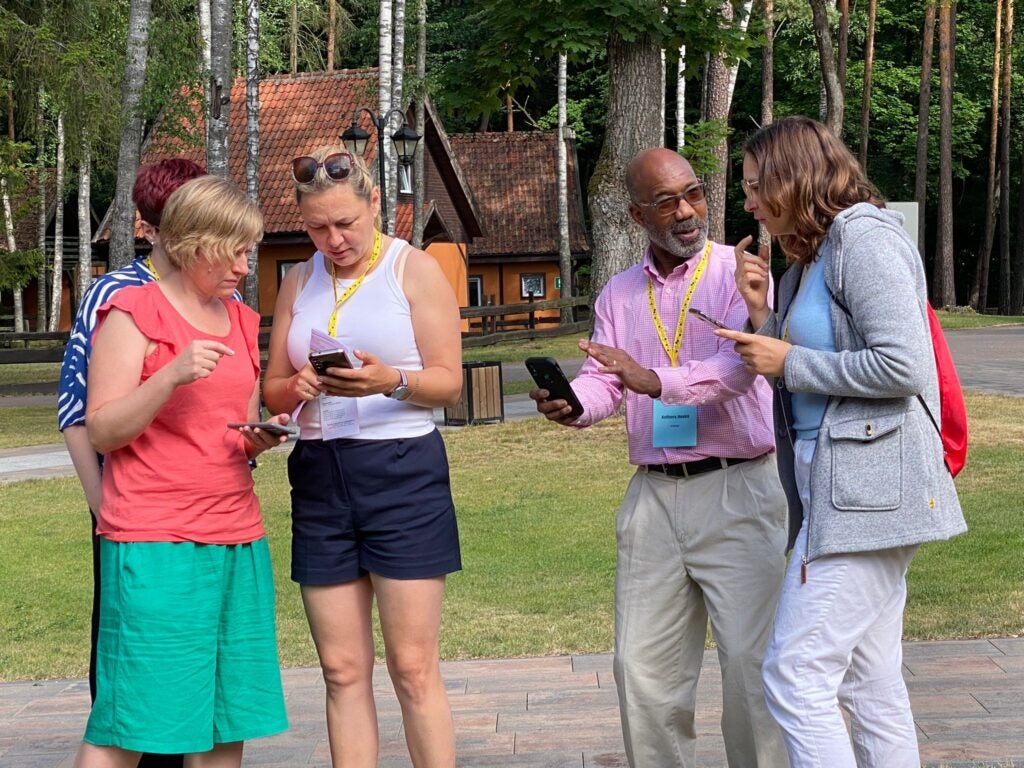
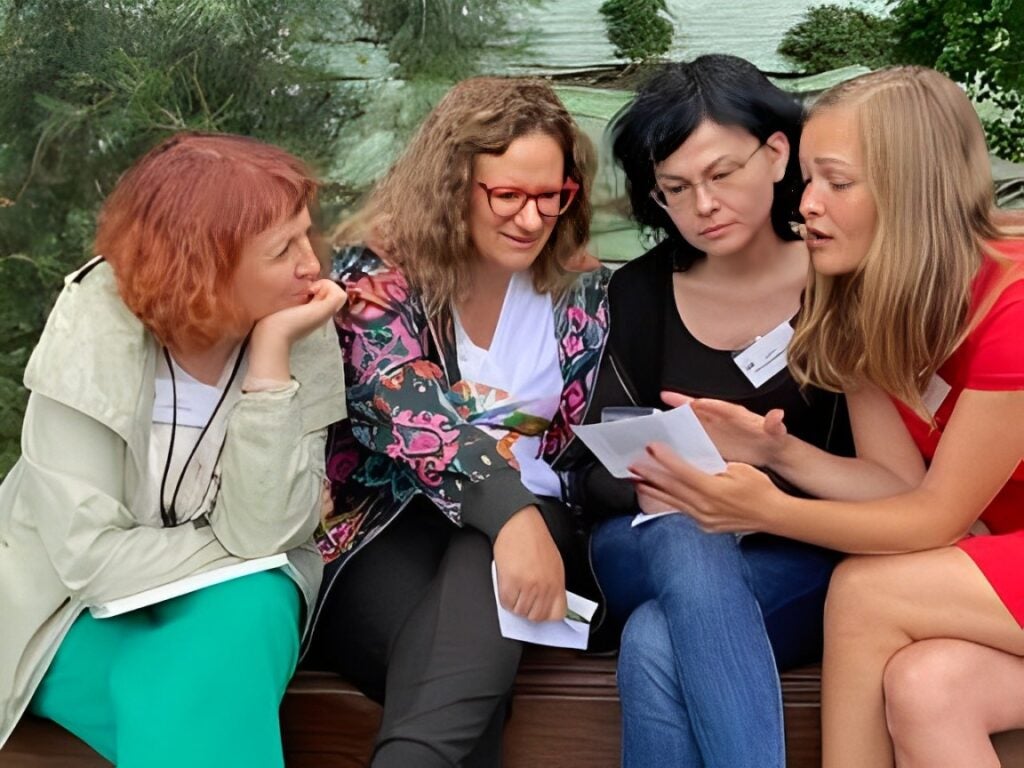
Share’s content included analyzing media representations of environmental issues and creating ecowriting pieces. “We addressed the practice of thinking globally while acting locally,” Share explained, emphasizing the project’s dual focus on language skills and environmental awareness. One particularly moving ecowriting activity involved teachers creating poems from the perspective of nature itself, which not only improved language skills but also deepened participants’ connection to their environment. “When students learning English engage in ecowriting about their experiences in nature,” he noted, “their fears and joys motivate them to use the language in an authentic way that holds intrinsic value.”
The synergy between Nesbit and Share’s approaches worked to create a positivity and energy that left everyone–including the Specialists themselves–better equipped for future work. Nesbit observed, “Jeff’s experience with pre-service teachers helped me understand things I may not have been aware of as a 25-year veteran classroom educator.” Share was also enthusiastic about the partnership, calling it an honor to work with Nesbit. “He is an amazing educator and did a fabulous job sparking joy and passion in the participants,” he said. This was clearly reflected in the last-day celebration which included dancing!
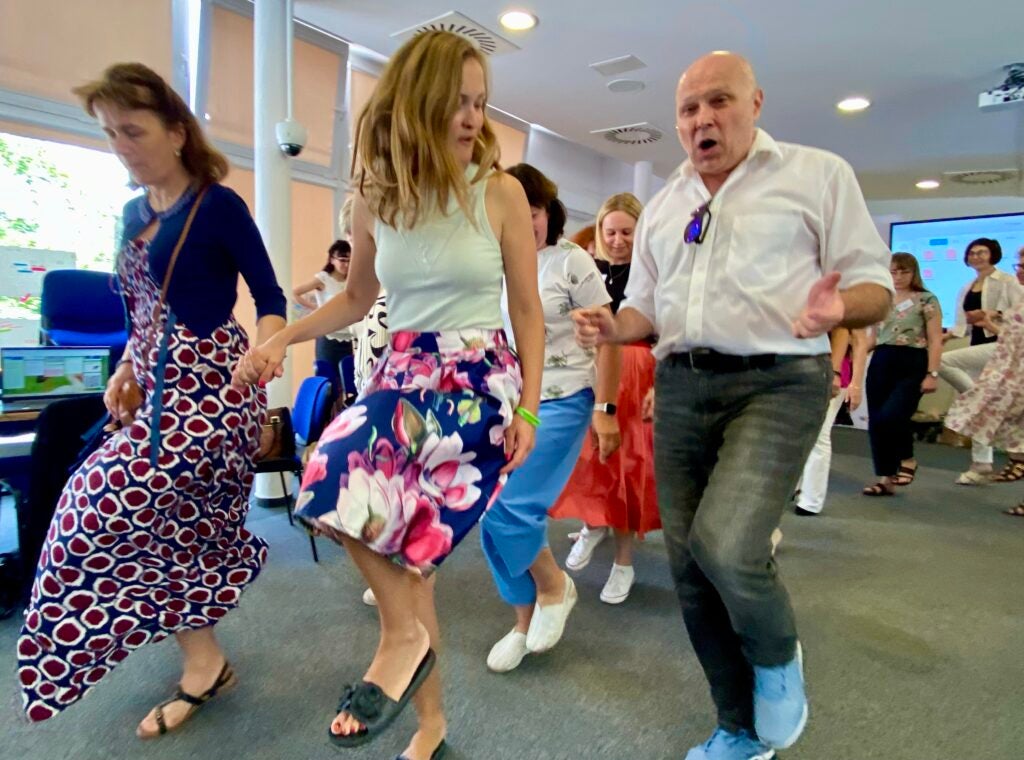
While the project inevitably came to a close, the results were just beginning. The Warsaw workshop participants are now an active network of educators equipped to integrate environmental education into English language teaching and share their experiences with others. Share notes that months after the end of the project, “almost daily, somebody in [the project’s chat] group is posting a picture they took in nature or sharing about a news article or art exhibit that addresses our connections with nature.” Nesbit concurred, voicing the Specialist Program’s capacity to motivate participants and their audiences alike. “After this workshop, I feel much more empowered about the types of changes that we can make as educators,” he said.
Anthony Nesbit is a veteran K-12 educator with more than 25 years of experience as a teacher of Spanish and English to speakers of other languages in North Carolina. He works with students who are acquiring English as a new language at all levels of English proficiency. He received his Bachelor of Arts degree in Spanish from the University of North Carolina at Chapel Hill and his Master of Arts in Teaching from the University of Southern California. Anthony has lived and worked in Spain and Costa Rica. He was awarded a Kenan Fellowship in 2018. As a Kenan Fellow, Anthony worked with local engineers and began incorporating science, technology, engineering, and mathematics into his English language development lessons. He has started and continues to incorporate gardening and composting into the school curriculum. Anthony has also served as part of the North Carolina English Learner Network Support Team where he has developed materials and facilitated workshops for teachers across the state. He has received numerous grants to incorporate digital tools and outdoor learning activities into his English language development classes.
Jeff Share worked for ten years as a freelance photojournalist documenting situations of poverty and social activism on three continents. In 1987 he won the Oskar Barnack Award and first prize in the “News Feature” category of World Press Photo for his work documenting a nine-month-long peace march for global nuclear disarmament. After leaving journalism, he entered the elementary school classroom to teach bilingual education in the Los Angeles Unified School District. While teaching elementary school for seven years, he also earned a master’s degree in media literacy. Next, Jeff joined the Center for Media Literacy as the Regional Coordinator for Training funded by a federal grant to teach educators how to engage their students in media literacy. Once the grant ended, he returned to school to earn his Ph.D. at the Graduate School of Education and Information Studies at the University of California, Los Angeles (UCLA).
Since graduating with his doctorate in 2006, Jeff has been working at UCLA in the Teacher Education Program training teachers in critical media literacy and teaching environmental justice to undergraduate students. His research and practice focus on transformative education, preparing K-12 educators to teach critical media literacy for social and environmental justice. He is a Fulbright Specialist and English Language Specialist and has taught teachers how to teach critical media literacy in China, Hungary, India, Iraq, Mexico, Poland, and Argentina. He has published over 50 articles and five books on critical media literacy and environmental justice. In 2024, he edited the book For the Love of Nature: Ecowriting the World. He is about to publish another book with Beach and Webb called Empowering Youth to Confront the Climate Crisis in English Language Arts. ORCID: https://orcid.org/0000-0001-6593-817X (https://jshare.wixsite.com/jeffshare)
